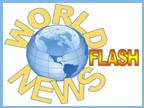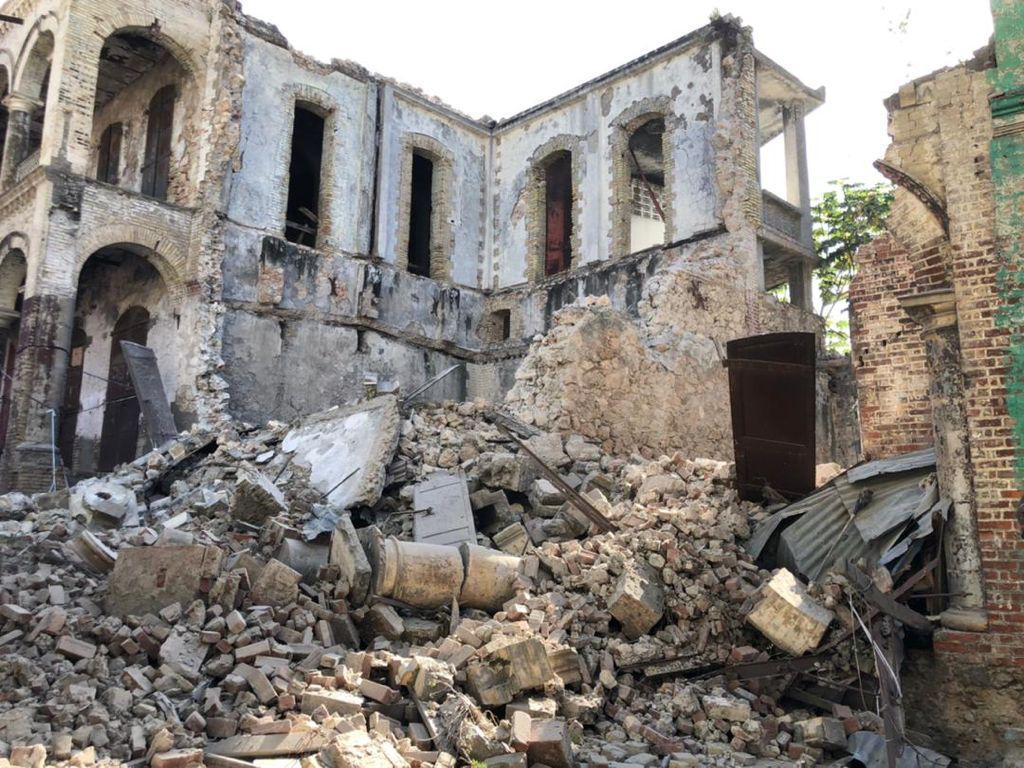
ANOTHER QUAKE: HITS HAITI: CARIBBEAN
In the wake of a presidential assassination and a difficult recovery from a previous earthquake, Haiti has now been shaken by another one.
The United Nations is working to support rescue and relief efforts in Haiti following a powerful earthquake that has left over 2,000 dead, with many more injured and missing, and caused massive damage in the southwestern part of the country. Initial reports indicate more than 700 collapsed buildings, including hospitals and schools, more than 13,000 homes destroyed, and significant damage to roads.
UN chief António Guterres said that he is closely following the latest unfolding tragedy in Haiti, while UNICEF reported that its teams already on the ground are making assessments to prioritize urgent needs and provide assistance to affected populations in the wake of the 7.2 magnitude quake.
“My heart goes out to all affected by the earthquake. My deepest condolences to all who have lost family and friends,” the Secretary-General said on Twitter.
Later in a statement issued by his Spokesperson, Mr. Guterres said that the United Nations, together with the humanitarian community in Haiti, is supporting the Government’s efforts to assist those affected by the earthquake and stands ready to provide further backing to the response.
“Our thoughts are with the people of Haiti following the devastating earthquake, said UN Deputy Secretary-General Amina Mohammed in a Twitter post where she also stressed that the Organization “is committed to delivering in solidarity with you.”
Separately, Collen Vixen Kelapile, President of the UN Economic and Social Council said the “people of Haiti are in our thoughts at this difficult time.” He added that the Council’s Ad Hoc Advisory Group on Haiti, will keep working to promote the long-term development of the country, referring to the body created to provide advice and promote socioeconomic recovery, reconstruction and stability in the country.
The effort to stabilize the island nation is being further hampered by Tropical Storm Grace, which brought rain, mudslides and heavy winds.
OFFICIALS RECOMMEND THIRD VACCINE SHOT: United States
As many were wondering if health officials would back the concept of a booster shot for COVID-19 protection, an even bolder idea was coming to fruition.
Days after recommending that people with compromised immune systems get booster shots, officials with the Food and Drug Administration (FDA) and the Centers for Disease Control and Prevention (CDC) have announced that it would recommend another vaccine shot for everyone, regardless of their immunity.
Several health officials from these outlets, including CDC Director Rochelle P. Walensky and White House adviser Dr. Anthony Fauci, released the following statement:
“The COVID-19 vaccines authorized in the United States continue to be remarkably effective in reducing risk of severe disease, hospitalization, and death, even against the widely circulating Delta variant. Recognizing that many vaccines are associated with a reduction in protection over time, and acknowledging that additional vaccine doses could be needed to provide long lasting protection, we have been analyzing the scientific data closely from the United States and around the world to understand how long this protection will last and how we might maximize this protection.
“The available data make very clear that protection against SARS-CoV-2 infection begins to decrease over time following the initial doses of vaccination, and in association with the dominance of the Delta variant, we are starting to see evidence of reduced protection against mild and moderate disease. Based on our latest assessment, the current protection against severe disease, hospitalization, and death could diminish in the months ahead, especially among those who are at higher risk or were vaccinated during the earlier phases of the vaccination rollout. For that reason, we conclude that a booster shot will be needed to maximize vaccine-induced protection and prolong its durability.
“We have developed a plan to begin offering these booster shots this fall subject to FDA conducting an independent evaluation and determination of the safety and effectiveness of a third dose of the Pfizer and Moderna mRNA vaccines and CDC’s Advisory Committee on Immunization Practices (ACIP) issuing booster dose recommendations based on a thorough review of the evidence. We are prepared to offer booster shots for all Americans beginning the week of September 20 and starting 8 months after an individual’s second dose.
“At that time, the individuals who were fully vaccinated earliest in the vaccination rollout, including many health care providers, nursing home residents, and other seniors, will likely be eligible for a booster. We would also begin efforts to deliver booster shots directly to residents of long-term care facilities at that time, given the distribution of vaccines to this population early in the vaccine rollout and the continued increased risk that COVID-19 poses to them.
“We also anticipate booster shots will likely be needed for people who received the Johnson & Johnson (J&J) vaccine. Administration of the J&J vaccine did not begin in the U.S. until March 2021, and we expect more data on J&J in the next few weeks. With those data in hand, we will keep the public informed with a timely plan for J&J booster shots as well.
“Our top priority remains staying ahead of the virus and protecting the American people from COVID-19 with safe, effective, and long-lasting vaccines especially in the context of a constantly changing virus and epidemiologic landscape. We will continue to follow the science on a daily basis, and we are prepared to modify this plan should new data emerge that requires it.
“We also want to emphasize the ongoing urgency of vaccinating the unvaccinated in the U.S. and around the world. Nearly all the cases of severe disease, hospitalization, and death continue to occur among those not yet vaccinated at all. We will continue to ramp up efforts to increase vaccinations here at home and to ensure people have accurate information about vaccines from trusted sources. We will also continue to expand our efforts to increase the supply of vaccines for other countries, building further on the more than 600 million doses we have already committed to donate globally.”
IVORY COAST: CONFIRMS EBOLA CASE AFRICA
On Aug. 14, the Ministry of Health of Cote d’Ivoire (Ivory Coast) confirmed the country’s first case of Ebola since 1994. This came after the Institut Pasteur in Cote d’Ivoire confirmed the Ebola Virus Disease in samples collected from a patient, who was hospitalized in the commercial capital of Abidjan, after arriving from Guinea.
Initial investigations found that the patient had travelled to Cote d’Ivoire by road and arrived in Abidjan on Aug. 12. The patient was admitted to a hospital after experiencing a fever and is currently receiving treatment.
Guinea experienced a four-month long Ebola outbreak, which was declared over on the June 19, 2021. There is no indication that the current case in Cote d’Ivoire is linked to the earlier outbreak in Guinea. Further investigation and genomic sequencing will identify the strain and determine if there is a connection between the two outbreaks.
This year Ebola outbreaks have been declared in the Democratic Republic of the Congo and Guinea, but it is the first time an outbreak has occurred in a large capital city such as Abidjan since the 2014–2016 West Ebola outbreak.
“It is of immense concern that this outbreak has been declared in Abidjan, a metropolis of more than 4 million people,” said Dr. Matshidiso Moeti, World Health Organization (WHO) Regional Director for Africa. “However, much of the world’s expertise in tackling Ebola is here on the continent and Cote d’Ivoire can tap into this experience and bring the response to full speed. The country is one of the six that WHO has supported recently to beef up their Ebola readiness and this quick diagnosis shows preparedness is paying off.”
WHO is helping to coordinate cross-border Ebola response activities and 5,000 Ebola vaccines doses which the organization helped secure to fight the outbreak in Guinea are now being transferred to Cote d’Ivoire, following an agreement between the ministries of health of Cote d’Ivoire and Guinea. An aircraft is departing Abidjan soon to collect the vaccines which will be used to vaccinate people at high risk, including health workers, first responders and contacts of confirmed cases.
WHO staff based in Cote d’Ivoire are supporting the investigation into the case. In addition, a multidisciplinary team of WHO experts covering all key response areas will be deployed rapidly to the field. They will help with ramping up infection prevention and control of health facilities, diagnostics, contact tracing, treatment and reaching out to communities to ensure they take a key role in the response.
Cote d’Ivoire declared the outbreak in line with International Health Regulations and WHO does not advise any travel restrictions to and from the country.
While countries are focused on the COVID-19 response, they should strengthen their preparedness for potential Ebola cases.
Ebola is a severe, often fatal illness affecting humans and other primates. Case fatality rates have varied from 25% to 90% in past outbreaks. There is now effective treatment available and if patients receive treatment early, as well as supportive care, their chances of survival improve significantly.


